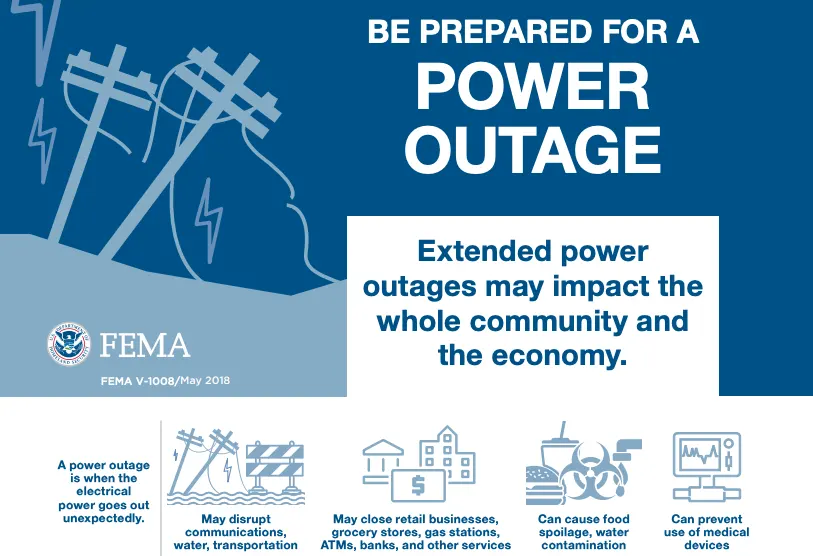Washington County > Emergency Management > Emergency Preparedness > Power Outages
Share |
Emergency Management Menu
Power Outages
Extended power outages may impact the whole community and the economy. A power outage is when the electrical power goes out unexpectedly.
A power outage may:
- Disrupt communications, water and transportation.
- Close retail businesses, grocery stores, gas stations, ATMs, banks and other services.
- Cause food spoilage and water contamination.
- Prevent use of medical devices.


Power Outage Tips
- Keep freezers and refrigerators closed.
- Use a generator, but ONLY outdoors and away from windows.
- Do not use a gas stove or oven to heat your home.
- Disconnect appliances and electronics to avoid damage from electrical surges.
- Have alternate plans for refrigerating medicines or using power-dependent medical devices.
- Check with local officials about heating and cooling locations open near you.
How to Protect Yourself During A Power Outage
Go to a community location with power if heat or cold is extreme.
Preparing for a Power Outage
Take an inventory of the items you need that rely on electricity. Plan for batteries and other alternative power sources to meet your needs when the power goes out, such as a portable charger or power bank. Have flashlights for every household member. Determine whether your home phone will work in a power outage and how long battery backup will last.
Know Your Medical Needs
Talk to your medical provider about a power outage plan for medical devices powered by electricity and refrigerated medicines. Find out how long medication can be stored at higher temperatures and get specific guidance for any medications that are critical for life.
Food Storage
Have enough nonperishable food and water. Keep freezers and refrigerators closed. The refrigerator will keep food cold for about four hours. A full freezer will keep the temperature for about 48 hours. Use coolers with ice if necessary. Monitor temperatures with a thermometer. Throw out food if the temperature is 40 degrees or higher.
Using Appliances During Power Outages
Install carbon monoxide detectors with battery backup in central locations on every level of your home. Avoid carbon monoxide poisoning. Generators, camp stoves or charcoal grills should always be used outdoors and at least 20 feet away from windows. Never use a gas stovetop or oven to heat your home. Turn off or disconnect appliances, equipment, or electronics. Power may return with momentary surges or spikes that can cause damage.
Coronavirus Disease 2019 (COVID-19)
Sign up for email updates about coronavirus from the Centers for Disease Control and Prevention (CDC). Check with your local officials for locations of cooling or warming centers. Locations may have changed this year due to the COVID-19 pandemic. Try to bring items that can help protect you and others in the cooling or warming center from COVID-19, such as two masks for each person age two or older in the household, hand sanitizer that contains at least 60 percent alcohol, and cleaning materials. Review the CDC’s guidelines for “Going to a Public Disaster Shelter During the COVID-19 Pandemic.”
Returning After A Power Outage
- When in doubt, throw it out! Throw away any food that has been exposed to temperatures 40 degrees or higher for two hours or more, or that has an unusual odor, color or texture.
- If the power is out for more than a day, discard any medication that should be refrigerated, unless the drug’s label says otherwise. Consult your doctor or pharmacist immediately for a new supply.

Emergency Management
16232 Elliott Parkway
Williamsport, MD 21795
Phone: (240) 313-2920
Email: [email protected]
TTY users may call any government office
through the Maryland Relay Service
1-800-735-2258